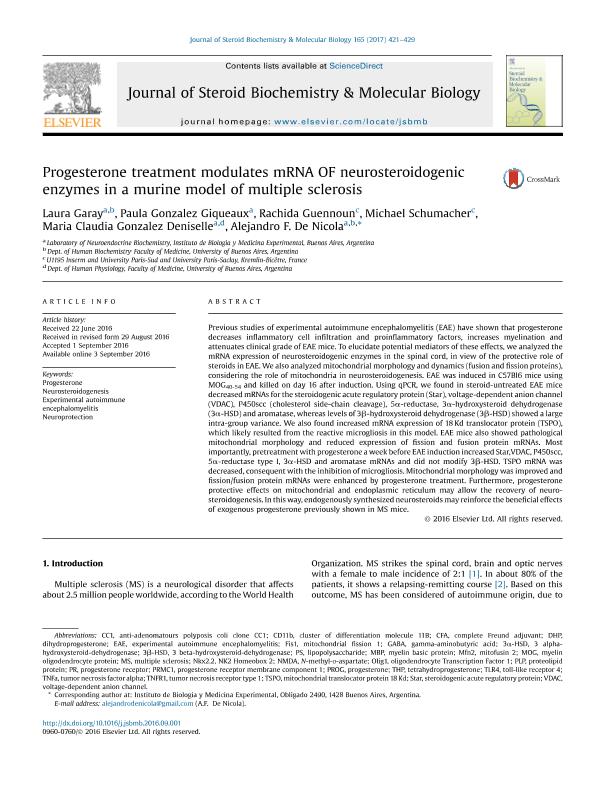Artículo
Progesterone treatment modulates mRNA of neurosteroidogenic enzymes in a murine model of multiple sclerosis.
Garay, Laura Ines ; González Giqueaux, Paula Anahí
; González Giqueaux, Paula Anahí ; Guennoun, Rachida; Schumacher, Michael; Gonzalez Deniselle, Maria Claudia
; Guennoun, Rachida; Schumacher, Michael; Gonzalez Deniselle, Maria Claudia ; de Nicola, Alejandro Federico
; de Nicola, Alejandro Federico
 ; González Giqueaux, Paula Anahí
; González Giqueaux, Paula Anahí ; Guennoun, Rachida; Schumacher, Michael; Gonzalez Deniselle, Maria Claudia
; Guennoun, Rachida; Schumacher, Michael; Gonzalez Deniselle, Maria Claudia ; de Nicola, Alejandro Federico
; de Nicola, Alejandro Federico
Fecha de publicación:
01/2017
Editorial:
Pergamon-Elsevier Science Ltd
Revista:
Journal of Steroid Biochemistry and Molecular Biology
ISSN:
0960-0760
Idioma:
Inglés
Tipo de recurso:
Artículo publicado
Clasificación temática:
Resumen
Previous studies of experimental autoimmune encephalomyelitis (EAE) have shown that progesterone decreases inflammatory cell infiltration and proinflammatory factors, increases myelination and attenuates clinical grade of EAE mice. To elucidate potential mediators of these effects, we analyzed the mRNA expression of neurosteroidogenic enzymes in the spinal cord, in view of the protective role of steroids in EAE. We also analyzed mitochondrial morphology and dynamics (fusion and fission proteins), considering the role of mitochondria in neurosteroidogenesis. EAE was induced in C57Bl6 mice using MOG40-54 and killed on day 16 after induction. Using qPCR, we found in steroid-untreated EAE mice decreased mRNAs for the steroidogenic acute regulatory protein (Star), voltage-dependent anion channel (VDAC), P450scc (cholesterol side-chain cleavage), 5α-reductase, 3α-hydroxysteroid dehydrogenase (3α-HSD) and aromatase, whereas levels of 3β-hydroxysteroid dehydrogenase (3β-HSD) showed a large intra-group variance. We also found increased mRNA expression of 18Kd translocator protein (TSPO), which likely resulted from the reactive microgliosis in this model. EAE mice also showed pathological mitochondrial morphology and reduced expression of fission and fusion protein mRNAs. Most importantly, pretreatment with progesterone a week before EAE induction increased Star,VDAC, P450scc, 5α-reductase type I, 3α-HSD and aromatase mRNAs and did not modify 3β-HSD. TSPO mRNA was decreased, consequent with the inhibition of microgliosis. Mitochondrial morphology was improved and fission/fusion protein mRNAs were enhanced by progesterone treatment. Furthermore, progesterone protective effects on mitochondrial and endoplasmic reticulum may allow the recovery of neurosteroidogenesis. In this way, endogenously synthesized neurosteroids may reinforce the beneficial effects of exogenous progesterone previously shown in MS mice.
Archivos asociados
Licencia
Identificadores
Colecciones
Articulos(IBYME)
Articulos de INST.DE BIOLOGIA Y MEDICINA EXPERIMENTAL (I)
Articulos de INST.DE BIOLOGIA Y MEDICINA EXPERIMENTAL (I)
Citación
Garay, Laura Ines; González Giqueaux, Paula Anahí; Guennoun, Rachida; Schumacher, Michael; Gonzalez Deniselle, Maria Claudia; et al.; Progesterone treatment modulates mRNA of neurosteroidogenic enzymes in a murine model of multiple sclerosis.; Pergamon-Elsevier Science Ltd; Journal of Steroid Biochemistry and Molecular Biology; 165; 1-2017; 421-429
Compartir
Altmétricas



